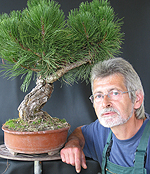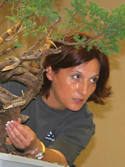Quercus larix
+8
p@scal
Todd Ellis
dorothy7774
martin kolacia
JimLewis
moyogijohn
Russell Coker
Karl Thier
12 posters
Page 1 of 1
 Quercus larix
Quercus larix
Hello people a Quercus pubescens, the styling is like a larch. I think this fits with the small leaves and the shape of the tree.







Karl Thier- Member
 Re: Quercus larix
Re: Quercus larix
Karl Thier wrote:Hello people a Quercus pubescens, the styling is like a larch. I think this fits with the small leaves and the shape of the tree.
It's very pretty, but why not style it like an oak?
R

Russell Coker- Member
 Quercus larix
Quercus larix
Hello Karl. Lovely elegant trunk line and really good bark. An Oak style would also work with the small leaves and shape of the tree too.
Guest- Guest
 Quercus
Quercus
Your tree is very nice.I REALLY LIKE THE TRUNK..I too would have liked the branches the way they were..I do like the pot sulection it looks good with the tree...take care john
moyogijohn- Member
 Re: Quercus larix
Re: Quercus larix
I like the trunk line. BUT I think letting it grow like an oak would help to hide the lack of taper -- as well as make it look more natural. I just don't think broad leafed, deciduous trees (no matter how small the leaves) do well styled like a pointy-top conifer.
Sorry.
Sorry.

JimLewis- Member
 Re: Quercus larix
Re: Quercus larix
lovely trunk , but i have to agree with other people...it is too strict

martin kolacia- Member
 Re: Quercus larix
Re: Quercus larix
Russell Coker wrote:Karl Thier wrote:Hello people a Quercus pubescens, the styling is like a larch. I think this fits with the small leaves and the shape of the tree.
It's very pretty, but why not style it like an oak?
R
I like this front in Oak style. One more natural, the other more- for the lack of the word- "traditional" perhaps? Karl, not trying to restyle the tree really, just a though process. You are very good at styling. -dorothy





dorothy7774- Member
 Re: Quercus larix
Re: Quercus larix
Karl, I like the shaping in your oak, very Penjing in mood. I would love to see it in leaf next year. I have seen many uniquely shaped deciduous trees in the thick woods in Virginia, and some literati type trees which had branches hanging down, such as yours. I often see foliage which grows out, and upwards; but not always. Trying to capture that in a literati style tree is challenging; many Penjing seem to opt for clouds of foliage. Go with your style. At the very least it is pretty, and shows lots of movement. Your oak with the literati shape; its curves and thick bark is not the usual order for Oaks; at least in our woods. Use the Oak Tree style for the oak trees that have thick trunks, multiple trunks, with nice, flared, root buttresses and trunk taper. Literati trees seem to have rules of their own. You did an excellent job with this beautiful tree IMHO. In time you may, or may not, remove some branches. Or the tree will.  Literati is one of my favorite styles. And a hard one to do.
Literati is one of my favorite styles. And a hard one to do.  Dorothy's renderings are lovely and make a believable tree. IMHO you aged the tree a hundred years by bending down the branches. The effect was instant. Time will tell how this tree should evolve.
Dorothy's renderings are lovely and make a believable tree. IMHO you aged the tree a hundred years by bending down the branches. The effect was instant. Time will tell how this tree should evolve.
I am trying to grow nice looking bonsai. In doing so, I learned some basic rules and styles and why certain techiniques work, and why others don't. I marvel at Walter's (and others') naturalistic styles and am trying to incorporate that into what I learned along the way. I think the bonsai artist attempts style a tree like it would look in nature, but adds an aesthetic design to it. In my bonsai journey, I have observed that the "aesthetic" (of what bonsai should look like) dominates. For instance, we see lots of collected Pines, Larch, Junipers, Sloes, Hawthorns, Hornbeams, Beeches, etc from Europe on IBC. The before pictures almost always show a huge mess of branches and foliage; a jumble or "mish-mash" if you will. Then, when the artist performs their magic, the tree is transformed. People comment that it looks good, and usually someone comments "...consider removing that branch, or bend that branch in this direction to enhance flow, design, etc..." And we understand why the suggestions was made, and the tree is enhanced. There are often different opinions; but most growers have developed an aesthetic sense and there are basic rules that all growers are encouraged to start with. Mother Nature, on the other hand, just does what she does best; the tree grows as best as it can, to survive, not following any (human) aesthetic rules. We impose the design rules. If anyone involved in this artistic pursuit, we call bonsai, were to let a pine grow like a pine, or an oak like an oak.... there would be no need for wire, tie-downs, weights, selective pruning, or special pots, or special soils, etc. What I'm saying is nothing new or profound in this art. We start out with material and the rest, as they say, is contrived, whether it is the "Natural Style" or not.
Salut, Todd
I am trying to grow nice looking bonsai. In doing so, I learned some basic rules and styles and why certain techiniques work, and why others don't. I marvel at Walter's (and others') naturalistic styles and am trying to incorporate that into what I learned along the way. I think the bonsai artist attempts style a tree like it would look in nature, but adds an aesthetic design to it. In my bonsai journey, I have observed that the "aesthetic" (of what bonsai should look like) dominates. For instance, we see lots of collected Pines, Larch, Junipers, Sloes, Hawthorns, Hornbeams, Beeches, etc from Europe on IBC. The before pictures almost always show a huge mess of branches and foliage; a jumble or "mish-mash" if you will. Then, when the artist performs their magic, the tree is transformed. People comment that it looks good, and usually someone comments "...consider removing that branch, or bend that branch in this direction to enhance flow, design, etc..." And we understand why the suggestions was made, and the tree is enhanced. There are often different opinions; but most growers have developed an aesthetic sense and there are basic rules that all growers are encouraged to start with. Mother Nature, on the other hand, just does what she does best; the tree grows as best as it can, to survive, not following any (human) aesthetic rules. We impose the design rules. If anyone involved in this artistic pursuit, we call bonsai, were to let a pine grow like a pine, or an oak like an oak.... there would be no need for wire, tie-downs, weights, selective pruning, or special pots, or special soils, etc. What I'm saying is nothing new or profound in this art. We start out with material and the rest, as they say, is contrived, whether it is the "Natural Style" or not.
Salut, Todd

Todd Ellis- Member
 Re: Quercus larix
Re: Quercus larix
Dorothy, again a very good virtual thank you.
In recent years, the naturalism in bonsai is growing in popularity. The reviews if you do not styled after are getting bigger, even if it is well- is meant. I style for 20 years trees and I know as my trees look like in the future, therefore forgive if I do not style after Separates. Here's another Quercus cerris.

In recent years, the naturalism in bonsai is growing in popularity. The reviews if you do not styled after are getting bigger, even if it is well- is meant. I style for 20 years trees and I know as my trees look like in the future, therefore forgive if I do not style after Separates. Here's another Quercus cerris.

Last edited by Karl Thier on Wed Dec 08, 2010 7:05 am; edited 1 time in total

Karl Thier- Member
 Re: Quercus larix
Re: Quercus larix
I have learnet a lot from the topics from Karl Thier. They are all pretty wellcrafted bonsaitrees, No doubt about that.
I have trained a fairly large Ulmus Parvifolia as a conifer for many, many years. This I know now, I just could not put a name to it.
I have decided to restyle the tree compleetely in the spring. I look forward to work .
.
Yvonne
I have trained a fairly large Ulmus Parvifolia as a conifer for many, many years. This I know now, I just could not put a name to it.
I have decided to restyle the tree compleetely in the spring. I look forward to work
Yvonne
Guest- Guest
 Re: Quercus larix
Re: Quercus larix
pascal47 wrote:Karl , why you work the oaks as hawthorn and hawthorn as larch.
Pascal, because I personally like to.
 The next oak for the critique released.
The next oak for the critique released. 



Karl Thier- Member
 Re: Quercus larix
Re: Quercus larix
The last oak you posted,
Have you considered using side 2 as the front, and reducing the height a bit at the largest trunk?
I like the tree but I think it might be better without the top, cause the straight section doesnt match 100% with the rest of the tree, to me.
Have you considered using side 2 as the front, and reducing the height a bit at the largest trunk?
I like the tree but I think it might be better without the top, cause the straight section doesnt match 100% with the rest of the tree, to me.

Storm- Member
 Re: Quercus larix
Re: Quercus larix
Hi Karl,
Very nice trees. I am fully with you when you say that one need not style a species as it is in nature.... meaning an Oak like an Oak and a Pine like a Pine etc. Doing so (Oak like an Oak) greatly restricts the creativity of the Bonsai artist and drastically restricts the styling options.
I agree with Todd that had the tree had a huge girth and many branches, some of which are low hanging and the tree had a great nebari then perhaps it could have been considered for styling as an Oak. What you have done is visually pleasing and I'd look forward to seeing it in leaf come spring for a confirmation of my belief stated above.
Regarding the second tree. I like the dramatic trunk movement on both the trunks. So graceful and yet so dramatic.
Dorothy - Exceptional visuals. I have always admired your visuals and you have not disappointed me this time either.
Regards
Ravi
Very nice trees. I am fully with you when you say that one need not style a species as it is in nature.... meaning an Oak like an Oak and a Pine like a Pine etc. Doing so (Oak like an Oak) greatly restricts the creativity of the Bonsai artist and drastically restricts the styling options.
I agree with Todd that had the tree had a huge girth and many branches, some of which are low hanging and the tree had a great nebari then perhaps it could have been considered for styling as an Oak. What you have done is visually pleasing and I'd look forward to seeing it in leaf come spring for a confirmation of my belief stated above.
Regarding the second tree. I like the dramatic trunk movement on both the trunks. So graceful and yet so dramatic.
Dorothy - Exceptional visuals. I have always admired your visuals and you have not disappointed me this time either.
Regards
Ravi
Last edited by Ravi Kiran on Sun Dec 05, 2010 1:03 pm; edited 1 time in total (Reason for editing : missed an 's')

Ravi Kiran- Member
 Re: Quercus larix
Re: Quercus larix
The last oak has the name of "the dragon's tail ". This is the brother and was found near the dragon's tail.




Karl Thier- Member
 Re: Quercus larix
Re: Quercus larix
Karl,
I am intrigued by your oaks. Where were they collected; what kind of terrain were they found in? Were these growing in higher elevations? Mountain type regions?
Thank you, Todd
I am intrigued by your oaks. Where were they collected; what kind of terrain were they found in? Were these growing in higher elevations? Mountain type regions?
Thank you, Todd

Todd Ellis- Member
 Re: Quercus larix
Re: Quercus larix
Todd Ellis wrote:Karl,
I am intrigued by your oaks. Where were they collected; what kind of terrain were they found in? Were these growing in higher elevations? Mountain type regions?
Thank you, Todd
Hi Todd, collected these oaks in Hungary. There are hills 500-600 meters above sea level very stony ground, that is no fun digging.


Karl Thier- Member
 Amazing Oaks
Amazing Oaks
hi karl,
those oaks are amazing !
thanks for sharing the start design - it helps me very much to see how you see the tree within the stump
from my expirience collecting oaks is very difficult - they have a very deep root system nad they are very sensetive to root mass.
can you provide some tips from your expirience so the oaks we collect have a better survival rate ?
any tip will help - when, how, after care - if you have any photos of the collection it will be superb !
again thanks for sharing
those oaks are amazing !
thanks for sharing the start design - it helps me very much to see how you see the tree within the stump
from my expirience collecting oaks is very difficult - they have a very deep root system nad they are very sensetive to root mass.
can you provide some tips from your expirience so the oaks we collect have a better survival rate ?
any tip will help - when, how, after care - if you have any photos of the collection it will be superb !
again thanks for sharing
Last edited by theBalance on Fri Dec 10, 2010 1:51 pm; edited 1 time in total (Reason for editing : wrong spelling + change post title)

theBalance- Member
 quercus larix
quercus larix
KARL,,I have looked at your oaks many times..they are very nice trees!! i still like the virtul # 3 that Dorthy made just my opion..the larger one is a tree to be really proud of..some good work on your part...take care john
moyogijohn- Member
 Re: Quercus larix
Re: Quercus larix
Hi karl,
I was just browsing Bonsai Techniques I by John Naka the other day and your twin trunk tree (pic below) bears a very striking resemblance to John Naka's Figure 390, page No. 207

Cheers
Ravi
I was just browsing Bonsai Techniques I by John Naka the other day and your twin trunk tree (pic below) bears a very striking resemblance to John Naka's Figure 390, page No. 207

Cheers
Ravi

Ravi Kiran- Member
 Re: Quercus larix
Re: Quercus larix
Ravi Kiran wrote:Hi karl,
I was just browsing Bonsai Techniques I by John Naka the other day and your twin trunk tree (pic below) bears a very striking resemblance to John Naka's Figure 390, page No. 207
Cheers
Ravi
Very true. Good memory Ravi.

Rob Kempinski- Member
 Similar topics
Similar topics» Picea Mariana (Black Spruce) and Larix Laricina (Tamarack) Collected Fall 2021. SPRING UPDATE *Larix pushing new needles!*
» larch with a good future
» larix fukinagashi
» Larix - restyyling - before and after 2012
» larix from poland
» larch with a good future
» larix fukinagashi
» Larix - restyyling - before and after 2012
» larix from poland
Page 1 of 1
Permissions in this forum:
You cannot reply to topics in this forum






